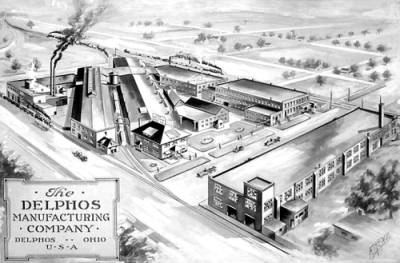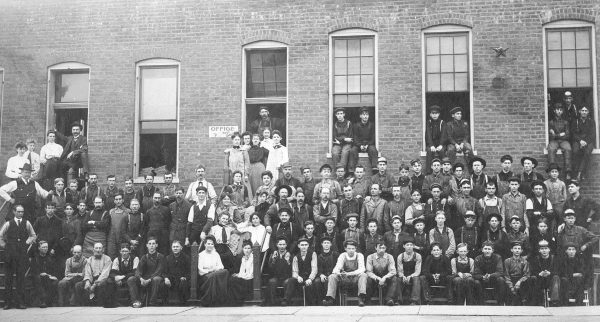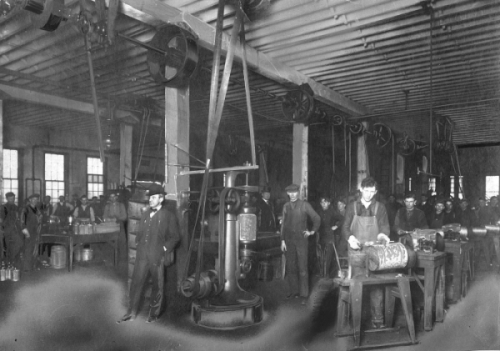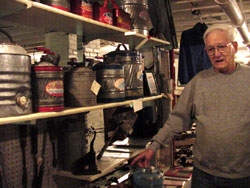Manufacturing company had long history in Delphos

An early 1900s aerial drawing of the Delphos Manufacturing Company shows the industrial complex and how trains once pulled between the buildings for loading products which were shipped across the nation.
Plant closed its doors with just three hours notice to employees
by Becky Hirn
The Delphos Herald
January 17, 2004
DELPHOS ó The New Delphos Manufacturing Company hasnít made headlines since 1991 ó the one-year anniversary of its closing ó when employees sued the company for lost pay and health coverage. The plant, owned for about two years by parent company Crunden Martin, went bankrupt and closed its doors Oct. 16, 1990, leaving 70 employees jobless with only three hours notice.
At the time of the closing, Bob Kimmet, vice president of operations, had worked at the plant for 20 years.
"Everybody knew there were problems but we had no idea at all theyíd close. It was a shocker. There were a lot of people in town who spent a lot of years there," he said.
Since then, the plant has had few owners and the property has dwindled. Weeds poke up through the cement surrounding the building. Broken windows and fences have gone unattended for years. In 1993, the empty and idle plant caught fire, destroying portions of the building. Kimmet said it was sad to see the property go downhill.
Now, with Delphos St. Johnís parish on the verge of buying the property and demolishing the deteriorating plant, it has given some the chance to reflect on the historic past of a mainstay of the Delphos industrial scene since 1898.
Elmer Hoffman began working at the factory in 1944, when he was just 16. The Delphos resident vividly remembers the process of making gas cans, one of the items the company was best known for producing.
"We rolled it, side-seamed it, corrugated it, and burred it. The next guy put the top and bottom on it. Then he shoved it down the track and they soldered the end seams. He pushed on down the belt and the next guy tested it for leaks with water pressure. The next one labeled it with a gasoline or kerosene sticker. And it got painted," Hoffman said.
Gas cans werenít the only thing Hoffman helped make. Over the years, he made spouting, gas caps, building corners and a variety of other New Delphos products. "If I was on piecework, it was good money and they had pretty good insurance," he said.
Hoffman remembered at one point getting 37.5 cents per hour. "Any overtime I could get, Iíd nab it," he said.
While looking over the New Delphos Manufacturing display at the Delphos Canal Commission Museum, Hoffman said factory operations werenít the same then as they are today. He pointed to an old aerial painting of the plant where railroad tracks angled off from the main line and ran between the New Delphos buildings.
"Years ago, there wasnít such a thing as a semi-truck that came through there. Lots of this stuff we put in a boxcar," he said.
Hoffman spent nearly 47 years at the plant before it closed.
For Gary Suever, another former employee of the plant, the sale and demolition plans of the old plant hasnít had much impact.
"All good things come to an end, I guess," Suever said.
Suever worked at New Delphos Manufacturing for 11 years before its closure.
"They called it the old finger factory and Iím one of the legends. I always tell people, ĎEleven years, four fingers and they closed the doorsí," Suever said.
Overall, Suever said heís happy to see his alma mater expanding.
"Definitely the purchase is a positive for the school and church," he said.
He added that thereís a lot of history in the office building and in the New Delphos business.
"The big thing was that it used to be locally owned up until the end. There were generations of families who worked there. The history and heritage are important," he said.
Local historian Bob Holdgreve said the can company would have been over 100 years old if it were still operating.
"Everyone would have liked to see it stay open and keep going. You always hate to see the old companies go but I guess thatís progress," Holdgreve said.
He added that the company is highlighted in a variety of local historical reference materials, including The Delphos Herald, The Delphos Courant, "The History of Allen County" and, most recently, "Reflections: A pictorial history of Delphos, Landeck, Ottoville and Fort Jennings, Ohio."
The history began in 1898 when the business was called the Delphos Can Company. Henry Leilich, one of the founders of the plant, came to Delphos from Germany in 1881.
The patented non-overflow pump can was its basic product. Originally, the plant was located west of the safety building on East Second Street. In 1906, the name changed to the Delphos Manufacturing Company and it moved to the two-story brick building along the Pennsylvania Railroad on Pierce Street and further expansion occurred over the years. The two-story brick building on the west side of Pierce Street was built in 1916. The "new" was added to the company name in 1922.
In the first few decades of the 1900s, galvanizing kettles were installed and the production of roofing and rain spouting began. The spouting and other products were sold throughout the nation. The production line included 10 sizes and styles of conductor pipe. Six sizes of half-round and box gutters were produced. Fittings, end pieces and caps were also made at the plant.
Oil and gasoline cans were also made from galvanized steel. Other, lighter-weight metals were used to make 15 different sizes of funnels. Water coolers were another product, along with a no-stoop dustpan.
Beginning in the 1930s, New Delphos also produced poultry and hog feeding equipment. There were a variety of trough feeders and waterers, laying nests and automatic egg-gatherers. The company also offered stamping, forming and fabricating facilities, including welding and soldering operations.
Just a couple years before the plant closed, the locally-owned company was sold to St. Louis-based Crunden Martin. When Crunden Martin filed for Chapter 11 in June 1990, the reorganization was intended to benefit the Delphos plant by closing the St. Louis plant and transferring the equipment to Delphos. The equipment transfer brought the production new products like garbage cans, buckets and wash tubs. However, 35 workers were laid off a few months later and the plant finally closed because steel suppliers were asking to be paid up front before delivering the steel.
While the plant will be demolished soon, the office building on the corner of First and Pierce is expected to stay.
Former New Delphos employee Greg Scherger said the office may need some updating but overall itís in remarkable shape.
"There are no major structural deficiencies. Itís just absolutely contrary to the plant," Scherger said.
Inside tiled and hardwood floors cover most of the two-story, nine-room office building. A grand staircase, two walk-in vaults and beveled glass in the entrance are evidence of the buildingís history. The woodwork in the building holds significance, too. Scherger said the wooden shelves, file cabinets and window frames were originally installed by the Ricker Brothers company, an early lumber company in Delphos. A small Ricker Brothers plaque is attached to an office shelf near the entry.
St. John the Evangelist Parish Business Manager Lonnie Miller said that after the purchase the parish will have to look at major systems like the electric, heating and air-conditioning, windows, plumbing and the roof, but overall the building is worth saving.
"Itís a beautiful old historic building that needs to be preserved in some manner," Miller said.
As for preserving the history of New Delphos Manufacturing Company, the stories of former employees, historic reference materials and the display at the Delphos Canal Commission Museum will remain as evidence of this long-standing Delphos industry.

Workers at the New Delphos Manufacturing Company pose for a
picture in this undated picture.

The can department at the Delphos Manufacturing Company.
|
|
|
|
The tiled hallway in the New Delphos office building shows some of the original woodwork in the building. Woodwork throughout the nine-room office building was installed by the Ricker Brothers company, an early lumber company in Delphos. |
A grand staircase in the New Delphos Manufacturing office building on the corner of First and Pierce streets has been well-preserved over the years. The Delphos St. Johnís parish plans to keep the office building when it purchases the New Delphos property. |

Former New Delphos Manufacturing employee Elmer Hoffman looks over gas cans, funnels and a variety of other New Delphos items on display at the Delphos Canal Commission Museum. Hoffman worked at the plant for nearly 47 years. (Delphos Herald photo)
Article from the Delphos Herald January 17,
2004 by Becky Hirn
Photos courtesy of the Delphos Canal Commission
Cans Display
Home | Community | Links | Photos | History | Cemeteries | War Casualties | Death Records | Town History |